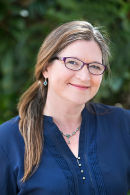Slavery & The Declaration of Independence
Slavery & The Declaration of Independence
On Thursday, May 23, 2019, Dr. Holly Brewer will join LancasterHistory to discuss the anti-slavery sentiment in Jefferson’s original draft of the Declaration of Independence, and the vigorous debates it led to. For event details and how to register, please scroll to the bottom of this page.
When Thomas Jefferson wrote the first draft of the Declaration of Independence in June 1776, he railed against the monarchy of King George III for being “determined to keep open a market where MEN should be bought and sold.” At the time, Jefferson owned about 200 slaves. He would continue to own slaves for the rest of his life.
Hypocritical or not, Jefferson’s public stance on the slave trade in his original draft of the Declaration of Independence was quite clear. “He has waged cruel war against human nature itself, violating its most sacred rights of life and liberty in the persons of a distant people who never offended him,” Jefferson wrote of King George III. “Captivating and carrying them into slavery in another hemisp[h]ere.” When the document was sent to Congress for its approval, the representative from South Carolina took issue with its anti-slavery sentiment. After it had been edited by Congress, the resulting document was still one that would send echoes of freedom throughout the colonies. But it didn’t mean the same for all the new country’s inhabitants as the original draft would have. The result was the strange juxtaposition of slavery amid calls for freedom. Dr. Holly Brewer will discuss the complex factors at play in these debates, and the resulting document which came to represent the fragile relationship between liberty and slavery in America.

Holly Brewer, Ph.D. is the Burke Professor of American History and an associate professor at the University of Maryland. She works on debates about justice in early America and the British Empire through the revolutionary period and into the nineteenth century. She is the author of By Birth or Consent: Children, Law, and the Anglo-American Revolution in Authority (2005), which won three national prizes in legal history, as well as of the prizewinning “Entailing Aristocracy in Colonial Virginia” (The William and Mary Quarterly, vol. 54, no. 2 April 1997). She is currently finishing a book on the ideological origins of slavery in early America and the British Empire for which she received a Guggenheim fellowship.
EVENT DETAILS & HOW TO REGISTER
A casual reception will begin at 4pm on Thursday, May 23 at LancasterHistory, 230 N. President Ave., Lancaster. The main presentation will begin at 4:30pm in Ryder Hall.
The program is free and open to the public but requires advance registration to guarantee a seat at the presentation. Register online by clicking “Buy Tickets” below or by calling (717) 392-4633. Questions and accessibility requests may be directed to info@lancasterhistory.org or (717) 392-4633. Ticketholders should bring a paper printout of their tickets or be able to display their tickets on a cellphone or other internet-enabled device to check-in to the lecture.
Membership Makes History Happen! Your membership enables us to bring dynamic speakers to LancasterHistory.org for our lecture series throughout the year, and gives you other exciting benefits! Learn more about becoming a member of LancasterHistory or renewing your membership today.
